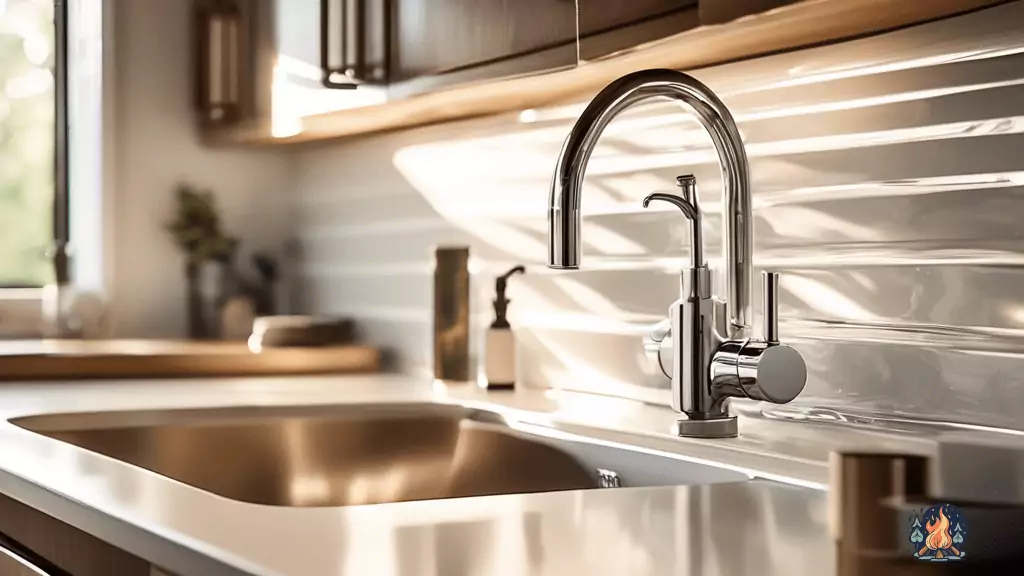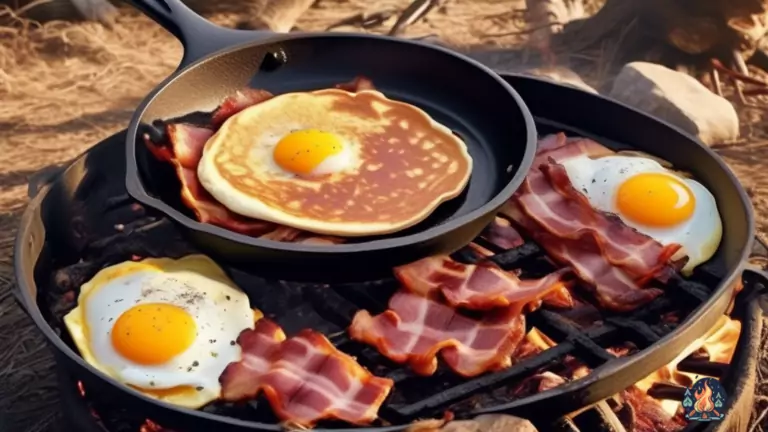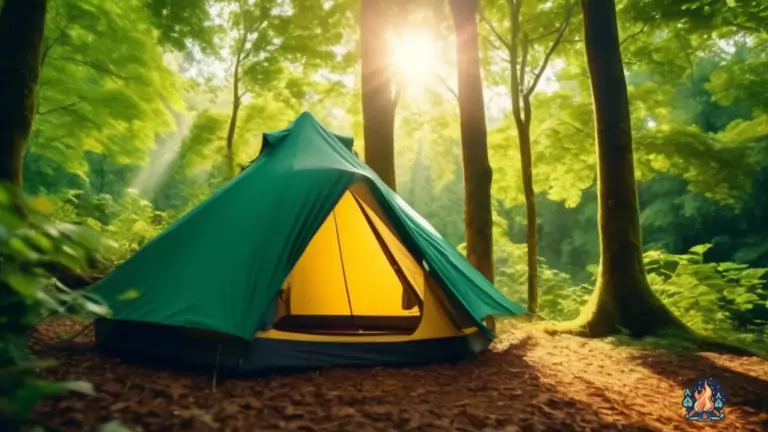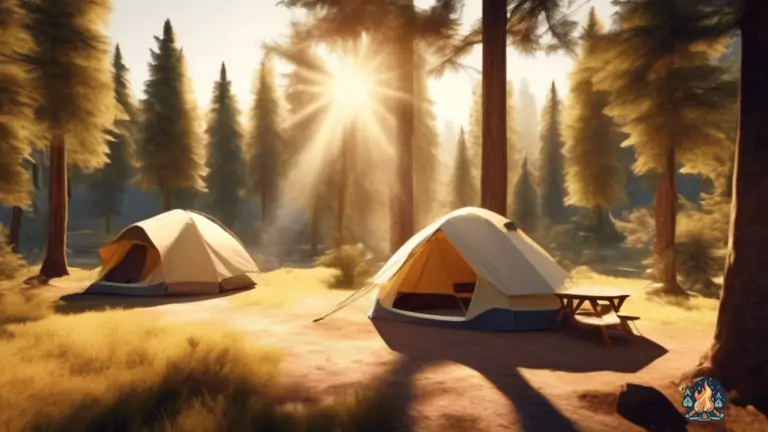Maintaining Your RV Water System: Tips And Tricks
by Kevin Fairbanks • Updated: January 21, 2024
Keep your RV water system running smoothly with our expert tips and tricks for maintenance. Don’t miss out on our essential guide! Click now to learn more about RV Water System Maintenance.

Are you a proud owner of an RV, ready to hit the road and embark on your next adventure?
Well, before you rev up that engine and start exploring the great outdoors, let’s talk about something vital – your RV water system.
Yes, that’s right, we’re going to dive into the world of water tanks, plumbing, and all things H2O.
But don’t worry, we promise to make it as entertaining as possible because, let’s face it, maintaining your RV water system doesn’t have to be as exciting as watching paint dry.
Now, picture this: you’re in the middle of nowhere, surrounded by breathtaking landscapes, and the only thing standing between you and the perfect camping experience is a malfunctioning water system.
Oh no! That’s where we come in, armed with a plethora of tips and tricks to ensure your RV water system stays in tip-top shape.
From flushing and cleaning your water tanks to properly winterizing your RV, we’ve got you covered.
So grab a cup of coffee, sit back, and get ready to become the master of all things water-related in your RV.
Let’s dive in, shall we?
Key Takeaways
- Regularly inspect your RV water system for signs of leaks, cracks, or loose fittings.
- Check for hidden leaks or water stains under the sink as they can indicate potential issues.
- Flush your pipes regularly to clear out debris and sediment, ensuring smooth water flow.
- Use RV-friendly pipe cleaner to prevent clogs and unpleasant smells in your water system.
Flushing and Cleaning Your Water Tanks
One important step in maintaining your RV water system is regularly flushing and cleaning your water tanks to prevent the buildup of bacteria and sediment. Let’s face it, nobody wants to drink water that’s been sloshing around in a tank filled with funky stuff.
So, grab your rubber gloves and get ready to dive into the world of tank cleaning! First things first, you’ll need to drain all the water from your tanks. This may seem like a no-brainer, but you’d be surprised how many people forget this step and end up with a wet and messy situation.
Once you’ve emptied the tanks, it’s time to get down and dirty. Mix up a solution of bleach and water, and pour it into your tanks. Let it slosh around in there for a while, like a mini swimming pool party for bacteria. After a good soak, drain the bleach solution and rinse the tanks thoroughly with fresh water.
Now, here comes the fun part. Grab your scrub brush and get ready to show those tanks who’s boss. Scrub every nook and cranny, making sure to remove any stubborn residue or gunk. Think of it as an arm workout with a side of cleanliness.
Once you’re satisfied with your scrubbing skills, rinse the tanks once again to make sure all the cleaning solution is gone. Voila! Your water tanks are now fresh and clean, ready to provide you with water that’s fit for a king (or queen).
Remember, regular maintenance is key to keeping your RV water system in tip-top shape. So, don’t forget to schedule regular tank cleaning sessions. Your taste buds will thank you, and your RV will be one happy camper.
Happy cleaning!
Checking for Leaks and Repairing Any Damage
To ensure your water system stays in top shape, be on the lookout for leaks and mend any issues as quick as a summer rainstorm. Checking for leaks in your RV water system is as important as checking for chocolate chips in your cookies. You don’t want any surprises when you take a sip of water and find out it’s more of a shower. So, grab your detective hat and let’s go on a leak-finding mission.
Now, I know what you’re thinking, "How do I even check for leaks?" Well, my friend, it’s as easy as pie. Just follow this handy-dandy table I’ve whipped up for you:
| Location | Signs of Leaks |
|---|---|
| Under the sink | Drip, drip, drip. |
| Around the toilet | A small puddle that’s not from your happy tears. |
| Outside the RV | A mysterious wet spot that wasn’t there before. |
| In the shower | A leaky faucet that’s not just crying from watching sad movies. |
| In the water pump compartment | A wet mess that’s not from a water balloon fight. |
Once you’ve identified the location of the leak, it’s time to channel your inner handyman and fix the issue. Grab your toolbox, put on your superhero cape, and get ready to become the hero of your water system. Whether it’s a loose connection, a cracked pipe, or a faulty valve, you’ve got this. Just remember, there’s no shame in calling for backup if you’re not comfortable with DIY repairs. A professional can swoop in and save the day faster than you can say "plumbing emergency." So, keep an eye out for leaks, fix them like a boss, and keep your water system flowing smoothly like a river on a sunny day.
Properly Winterizing Your RV Water System
Make sure you properly winterize your RV water system to prevent any damage during the colder months. Trust me, you don’t want to wake up one morning and find your pipes frozen solid like a popsicle. It’s not a fun way to start the day, let me tell you.
So, here’s what you need to do. First, drain all the water from your tanks, pipes, and fixtures. Think of it like giving your RV a good old-fashioned colonic. Get rid of all that water that could potentially freeze and wreak havoc.
Next, you’ll want to add some antifreeze to the system. No, not the kind you put in your car (although that would certainly make for an interesting road trip). I’m talking about RV antifreeze, specifically designed to protect your water system from freezing temperatures. Just pour it into your tanks and run it through your pipes and fixtures. It’s like giving your RV a nice warm blanket to snuggle up with during the winter. And don’t worry, it won’t harm you or your pets if you accidentally drink it. Although, I wouldn’t recommend making it a regular part of your diet.
So there you have it, folks. Winterizing your RV water system is a crucial step to ensure your pipes don’t turn into icicles. Follow these steps, and you’ll be able to enjoy a worry-free winter camping experience.
And remember, if all else fails, you can always trade in your RV for a cozy igloo. Just kidding, please don’t do that.
Filtering and Treating Your Water for Safe Consumption
Ensure the purity of your drinking water while on the road by filtering and treating it, so you can quench your thirst with confidence and peace of mind.
Let’s face it, the water you find along your journey may not always be the cleanest or tastiest. But fear not, fellow traveler! With a few simple steps, you can transform that questionable liquid into a refreshing elixir that would make even the most discerning taste buds dance with delight.
So, how do you go about this magical transformation, you ask? Well, let me break it down for you in a way that even your great aunt Gertrude, who still believes in the healing powers of crystals, can understand.
Here are five ways to filter and treat your water, guaranteed to make you the hero of hydration:
- Water filters: These handy devices will remove impurities, such as bacteria, parasites, and even the occasional rogue fish, from your water. Just make sure you choose one that suits your needs and budget, because let’s face it, you don’t want to spend your entire life savings on a glorified straw.
- Water softeners: If you’re tired of feeling like you’re showering in a rainforest, a water softener can come to the rescue. These nifty gadgets will remove the minerals that make your water hard, leaving you with silky smooth H2O that will have you singing in the shower like nobody’s watching.
- UV sterilizers: Forget about waving a magic wand and saying "abracadabra" – UV sterilizers are here to save the day. These devices use ultraviolet light to zap any remaining bacteria or viruses in your water, ensuring that your taste buds don’t have to play Russian roulette with every sip.
- Water distillers: If you’re the type of person who likes to take things to the next level, water distillers are for you. These bad boys heat your water to the point of vaporization, then condense it back into liquid form, leaving behind all the nasties that were lurking in your water. It’s like a science experiment, but with the added bonus of deliciously pure water.
- Water flavor enhancers: Let’s be real, sometimes even the purest water needs a little extra oomph. That’s where water flavor enhancers come in. Whether you prefer a hint of citrus, a burst of berry, or a touch of tropical paradise, these little bottles of liquid magic will transform your water into a taste sensation that will have you saying, "Move over, Gatorade!"
So, my fellow road warrior, with these tips and tricks up your sleeve, you can ensure that your water is not only safe to drink but also a pleasure to savor.
Happy hydrating!
Regularly Inspecting and Maintaining Your Plumbing System
Regularly inspecting and maintaining the plumbing system in your RV is essential for avoiding costly repairs and ensuring a smooth and worry-free travel experience. Nobody wants to be on a cross-country road trip and suddenly find themselves ankle-deep in water because of a burst pipe. Trust me, that’s not a fun way to cool off in the summer heat!
So, let’s talk about some tips and tricks to keep your plumbing in tip-top shape.
First things first, make it a habit to do a visual inspection of your plumbing system before every trip. Look for any signs of leaks, cracks, or loose fittings. And hey, if you’re feeling adventurous, grab a flashlight and channel your inner plumber by getting down and dirty under the sink. Check for any hidden leaks or water stains that might indicate a problem. Remember, prevention is better than a soggy surprise!
Next, give your pipes some love by flushing them out regularly. No, I don’t mean taking them out for a fancy dinner. I’m talking about running clean water through your pipes to clear out any debris or sediment that might have accumulated. It’s like giving your plumbing system a refreshing spa day! And while you’re at it, why not treat your pipes to some pipe cleaner? Just like you, they deserve a little TLC. So, grab some RV-friendly pipe cleaner from your local store and follow the instructions on the bottle. Your pipes will thank you, and you’ll avoid any unwanted clogs or funky smells.
Remember, maintaining your RV’s plumbing system doesn’t have to be a daunting task. With a little bit of regular inspection and some basic maintenance, you can keep your pipes flowing smoothly and avoid any unexpected waterworks.
So, go forth and conquer that plumbing system like the RV warrior you are!
Frequently Asked Questions
How often should I flush and clean my RV water tanks?
You should flush and clean your RV water tanks at least once every three months to ensure clean and fresh water. Think of it as giving your tanks a spa day and keeping them happy and healthy!
What are the signs of a water tank leak and how can I repair it?
If you notice water dripping where it shouldn’t be, or if your water tank mysteriously empties overnight, you might have a leak! Don’t panic, though. Repairing it could be as simple as patching a small hole or replacing a damaged fitting.
Is it necessary to winterize my RV water system if I live in a warm climate?
Of course not! Why bother winterizing your RV water system if you live in a warm climate? Water freezing and causing damage? Nah, that’s just a myth. Go ahead and ignore it. Enjoy the consequences!
What are the best methods for filtering and treating RV water to ensure safe consumption?
To ensure safe consumption of your RV water, start by filtering it with a quality water filter. Then, use a water treatment solution, like chlorine tablets or UV sterilizers, to kill any remaining bacteria. Bottom line: don’t let your water mess with your digestive system!
Are there any specific tools or products I should use to regularly inspect and maintain my RV’s plumbing system?
To keep your RV’s plumbing system in tip-top shape, consider investing in a trusty pipe inspection camera. This handy tool will help you spot any hidden leaks or clogs, ensuring you don’t have any surprise waterworks on your hands.

Hi, I’m Kevin, a lifelong camping enthusiast and the voice behind Campfire Discoveries. From tent to RV to cabin camping, I’ve explored it all. Join me as we share stories and tips around the campfire, deepening our connection with the great outdoors.
Keep Reading
-
Delicious Campfire Breakfast Recipes To Start Your Day Right
Craving a scrumptious campfire breakfast? Check out these mouthwatering recipes that will make your taste buds sing. From sizzling bacon to fluffy pancakes, start your day right with our delicious campfire breakfast ideas. Click here for the ultimate morning indulgence!
-
Best Tent For Camping: A Comprehensive Guide
Looking for the best tent for camping? Look no further! Explore our comprehensive guide to find the perfect shelter for your outdoor adventures. Get ready to elevate your camping experience now!
-
Camping Tent Types: A Comprehensive Guide
Looking for the perfect camping tent? Our comprehensive guide has all the info you need on different types of camping tents, from dome to cabin. Start exploring now and find your ideal tent for your next adventure!



